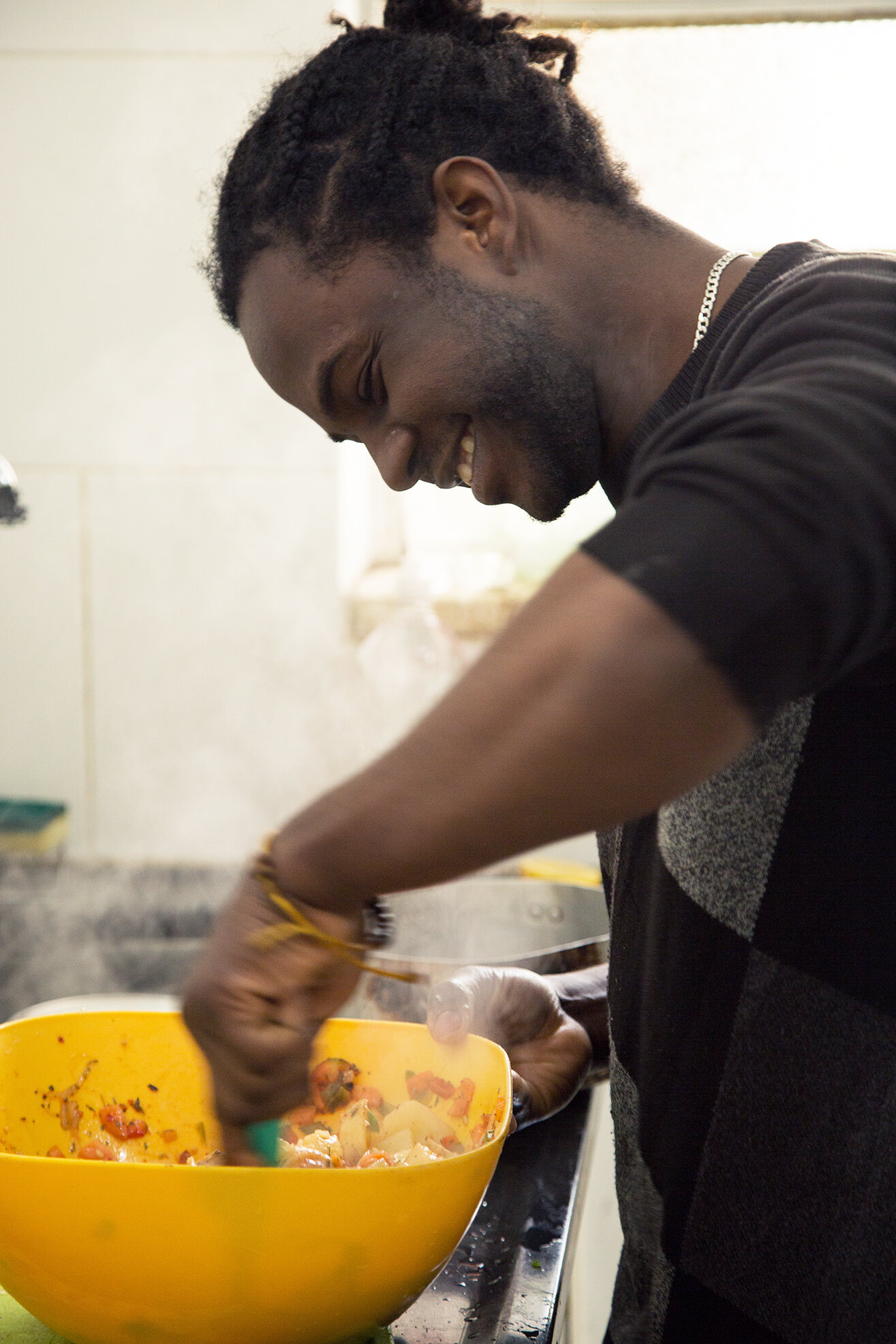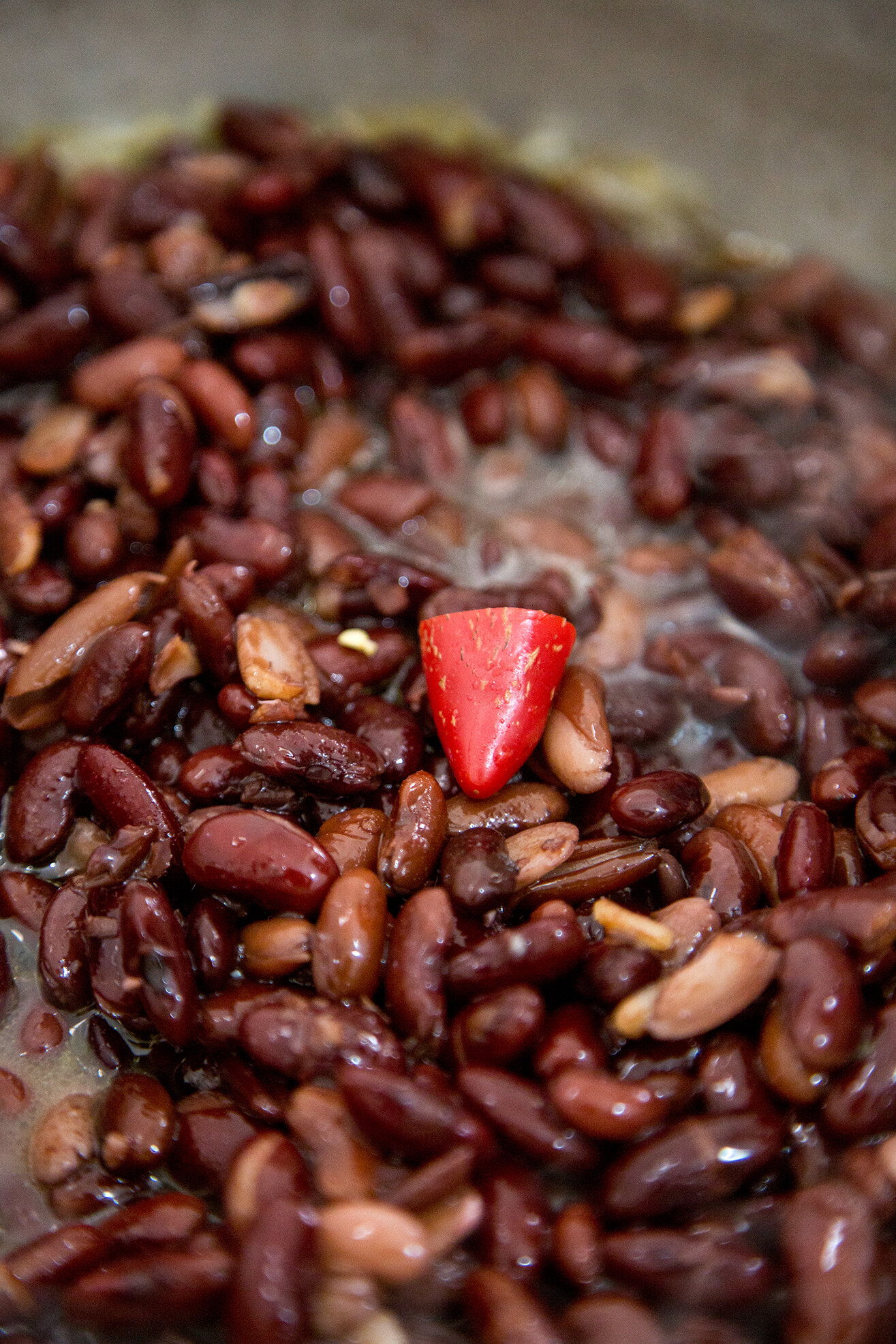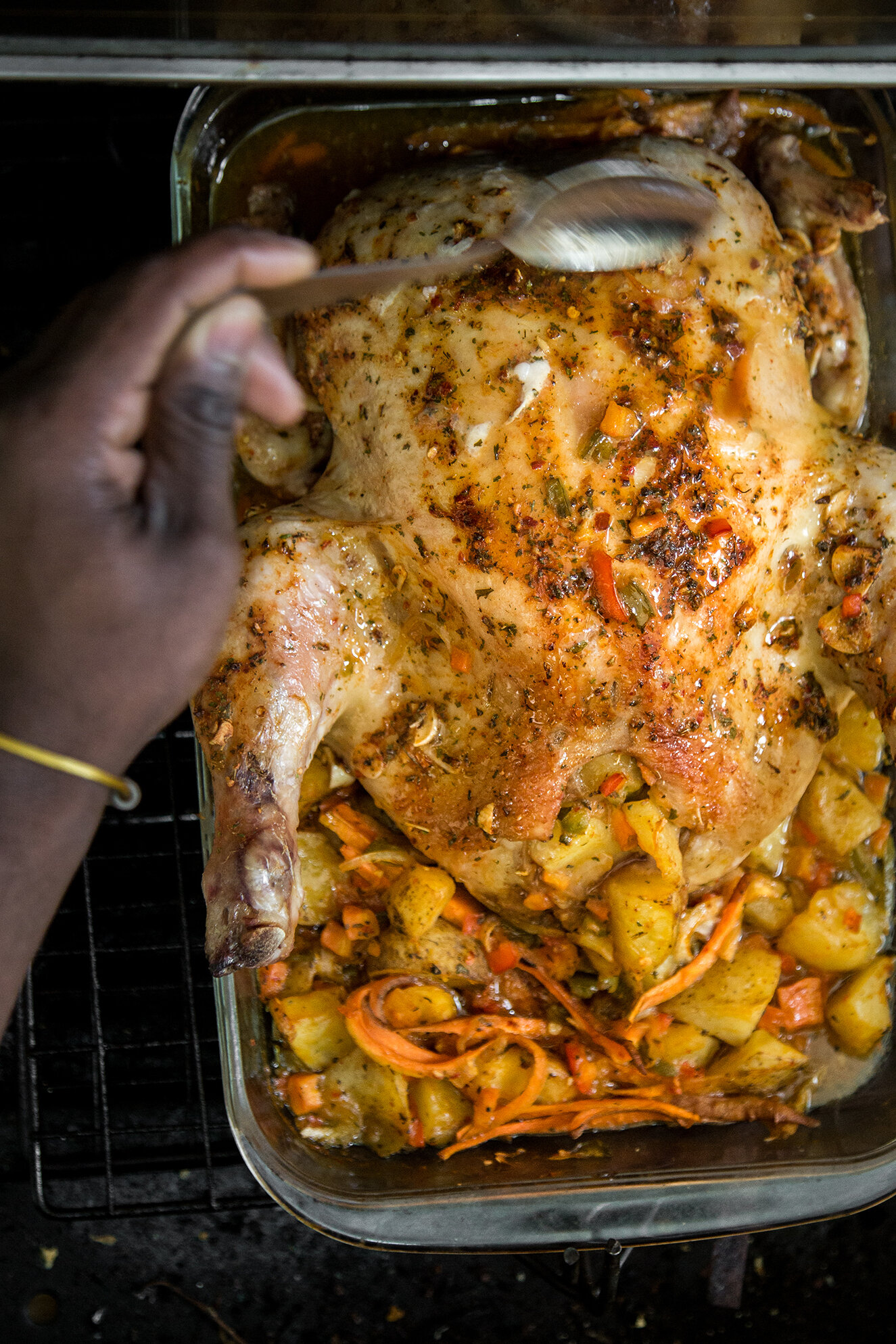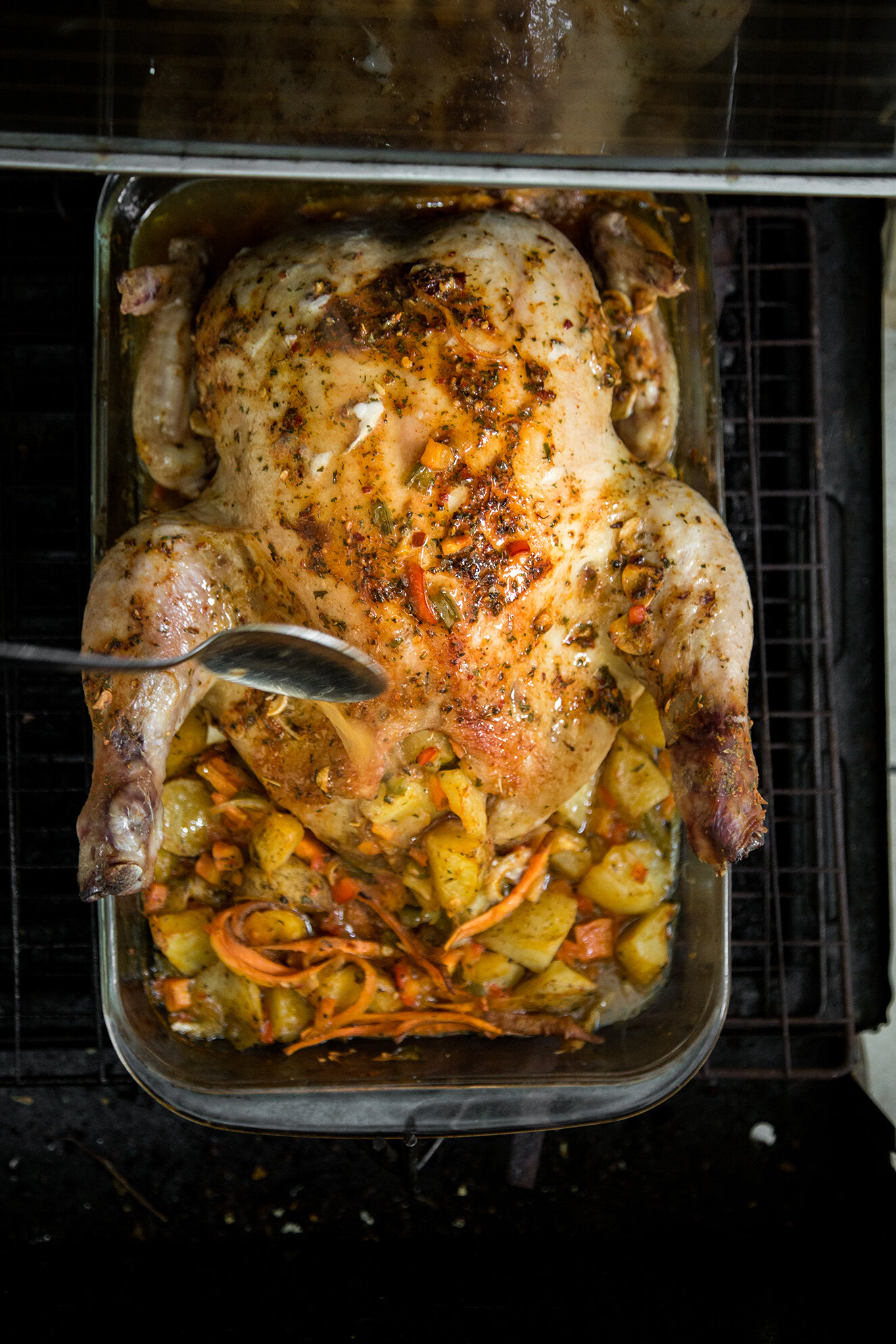Robby Glésile, Elyse Pierre & Olivier Danache
5.860 km. between Port-au-Prince, Haiti and Rosario, Argentina.
(Versión en español, al final)
Robby Glésile
Robenson Glésile opens the house´s door and smiles broadly, gently. It is a sincere and natural response, like everything in him. His tranquil, calm voice gives back an unusual peace. Like the peace of those Caribbean landscapes that he left behind almost nine years ago.
Because Haiti, although we sometimes forget it, is part of that Caribbean Sea that has spread so much cultural diversity from one shore to another, like seeds. This country, with a rich heritage, is the living manifestation of cultural legacy. And also, perhaps, one of the biggest debts we have as a globalized world.
So struck by so many natural disaster and overwhelmed by corruption, it has become one of the America’s poorest countries. Hence, migration is the solution for young people looking for a possible and more stable future.
Haiti's national motto, “L’union fait la force” (Unity is strength), has undoubtedly produced on Haitian migrants a very special way of bonding with each other and with the world.
Understanding that for immigrants it takes on much more meaning, since in the union it is where the Haitian community has found its greatest strength.
We will hardly find one haitian alone. They always go on small groups - a flock of migratory birds - that they cohabit, sharing their jobs, the daily life and the reasons why, most of them, migrated. Together they undertake life and establish new roots and together they overcome cultural differences, which sometimes can be dreadful.
Robby, Olivier y Elyse
Due their skin color they have gone through some labor exclusions and discrimination in public places in Rosario. However, this has not affected their spirit of adaptation. Rather, these situations have led them to actively develop campaigns for respect and inclusion, opening a necessary debate in spaces as controversial as nightclubs and the way in which their doormen behave and act with and immigrants. -Not only Haitians-.
Creole is the Haiti’s co-official language - along with French - based on Taino, French, Spanish and African. And it is in that language that the konpa sounds, a music that sounds a little similar to the classic Dominican merengue.
Except for the language and a slightly slower pace, the similarity is remarkable. It cannot be denied that the proximity of one country to the other has generated this intersection. And it is wonderful.
Today there is nothing in particular to be celebrated, however they create a festive atmosphere. The music plays, Olivier Daniel Danache, Elyse Pierre and Robby cook a celebratory menu: Riz national, salade russe and poulet bourré. Together they make what will be an unforgettable banquet.
The three of them emigrated from Port-au-Prince at different times and later met in Rosario. Here they study, work and accompany each other in the most important moments and in the daily life as well. The complicity reveals that calm of knowing that you are accompanied by someone who speaks your language, shares your traditions and recognizes his joy in yours.
Olivier insists that the chicken must be cleaned very well. How well you must know how to clean it, that it is practically necessary for women to know how to do it in order to get married. Elyse, indeed, is in charge of cleaning it thoroughly. Robby adds that it is even cleaned with hot water, which are sanitary measures due the country's hygiene circumstances.
Between news about the Haiti´s people recently protests and the memories of their families, they drop a clue about what they are cooking. "In Haiti, if you don't eat rice, it's like you didn't eat," says an smiling Olivier.
Olivier Danache
Elyse Pierre
To Elyse, milanesas with fries, are her favorite argentinian meal, but she could eat the haitian menu they are preparing today every day without getting bored. Because you can not argue with the taste: you will always prefer the flavors with which you grew up.
She, as student of the Tourism career, would return to Haiti. And she says it without any doubt. She would do it to change the way in which tourism is done in that country because she believes that it is a great resource and is little explored in that part of the Antilles. Gastronomy is a fragment of that idea.
Haitian traditional recipes is a cross between African and European cuisine, with a French cuisine strong presence. It is the robust use of herbs and spices, which are in very particular proportions and mixtures that mark a big difference. As usually happens, each house, each family, has its own seasoning, and although cooking is a woman’s job in Haiti’s family system, when it comes to emigrating, you must prepare and adapt. Robby, for example, was taught to cook by his older sister.
Perhaps that is why Robby has turned his need for cooperation collaborating as vice coordinator of the Jèn Mapou Foundation (Rosario Section), thus articulating educational activities for the Haitian community that lives in that city. He knows diaspora from within, he knows what is need to be strengthen and he directs his efforts over there.
A few hours have already passed, long enough for everything to be on the table and shared. The food’s aroma floods the corners of the house and is so seasoned that it inevitable to wake anyone's appetite.
The rice has been cooked alongside the red beans, which were previously soaked and sautéed with abundant garlic, chili and spices. The steam from the pot lets out the unmistakable aroma of the legume: a little smoky, a little earthy. Perhaps there is something of that symbolism, of that presence of earthy color in the birth of this popular recipe. This is a dish that accompanies great celebrations and like all dishes of its style, its origin is usually rather rooted in ancestry and its simplicity. So from the land they inhabit.
The salad glows from the bowl. All its colors covered with the beet’s magenta provide an unexpected shine. Between the softness of the potato starch and the sweetness of the other ingredients, this salad will come to refresh and balance the seasoned and slightly spicy taste of the other dishes.
Olivier checks the oven. Inside are a stuffed chicken with vegetables and covered with a mixture of spices and aromatic herbs, which are what have given it such a provocative aroma. When it’s open, he takes a deep breath and is so obvious that his taste buds are the ticket to some joyful memory, because he smile happily while rubs the chicken with its juices once again.
Robby, Elyse and Olivier set the table and with great joy and great excitement they sit down to eat, to travel back to Haiti through every bite. Crossing oceans and reaching the kitchens of their houses. Living once again a celebration for the simple pleasure of celebrating and sharing, with a feast of Russian salad, rice with red beans and stuffed chicken.
(Spanish version)
Robby Glésile, Elyse Pierre & Olivier Danache
5.860 km. entre Port-au-Prince, Haití y Rosario, Argentina.
Robenson Glésile abre la puerta de la casa y sonríe ampliamente, con dulzura. Es una respuesta sincera y natural, como todo en él. Su voz pausada y tranquila devuelve una paz poco común. Como la paz de aquellos paisajes caribeños que dejó atrás hace casi nueve años.
Porque Haití, aunque a veces lo olvidemos, es parte de ese Mar Caribe que tanta diversidad cultural ha ido esparciendo de una orilla a otra como semillas. Este país, con un acervo riquísimo, es la viva manifestación de las herencias culturales. Y también, quizás, una de las más grandes deudas que tenemos como mundo globalizado.
Tan golpeado por tantas situaciones de desastres naturales y abrumado por la corrupción, se ha convertido en uno de los países más pobres de América. De allí que migrar sea la solución para los jóvenes que buscan un futuro posible y más estable.
El lema nacional de Haití, “L’union fait la force” (La unión hace la fuerza), sin duda ha generado en los haitianos emigrados una forma muy especial de vincularse entre sí y con el mundo. Entendiendo que cuando se emigra esta frase cobra mucho más significado, pues en la unión es donde la comunidad haitiana ha encontrado su mayor fortaleza.
Difícilmente hallaremos a uno de ellos en solitario. Siempre van en grupo –bandada de aves migratorias-, conviven en grupo, comparten los trabajos, la vida cotidiana y las razones por las cuales la mayoría emigró. Juntos emprenden la vida y un nuevo arraigo y juntos sortean las diferencias culturales, que a veces pueden ser abismales.
Por el color de la piel han atravesado algunas tormentas de exclusión laboral y discriminación en lugares públicos en Rosario. Sin embargo esto no ha mellado en su espíritu de adaptación. Estas situaciones más bien han generado que elaboren activamente campañas por el respeto y la inclusión, abriendo un debate necesario en espacios tan controvertidos como los locales nocturnos y la manera en la que actúan los porteros de los mismos con el público en general y con los inmigrantes –no sólo haitianos- en particular.
El creole es el idioma co-oficial de Haití – junto al francés- con base en el taíno, francés, español y africano. Y es en esa lengua que suena el konpa, una música ligeramente parecida al merengue clásico dominicano.
Salvo por el idioma y un ritmo un poco más lento, es notable el parecido. No se puede negar que la proximidad de un país al otro ha generado este entrecruzamiento. Y es maravilloso.
Hoy no se celebra nada en particular, sin embargo el ambiente es festivo. La música suena, Olivier Daniel Danache y Elyse Pierre cocinan junto a Robby un menú de celebración: Riz national, salade russe y poulet bourré. Juntos preparan lo que será un banquete inolvidable.
Los tres emigraron de Port-au-Prince en distintas épocas y se conocieron en Rosario. Acá estudian, trabajan y se acompañan en los momentos más importantes y en los más cotidianos también. Como este instante en el que cocinan juntos. Es evidente la complicidad que se establece en la calma de saberse acompañado por alguien que habla tu idioma, comparte tus costumbres y reconoce su alegría en tu alegría.
Olivier insiste en que al pollo hay que limpiarlo muy bien. Que tan bien hay que saber limpiarlo, que es prácticamente menester de la mujer saber hacerlo para poder casarse. Elyse, justamente, es la encargada de limpiarlo a profundidad. Robby agrega que incluso se limpia con agua caliente, que son medidas sanitarias adoptadas dadas las circunstancias de higiene del país.
Entre noticias sobre las protestas en Haití y los recuerdos de sus familiares, van dejando caer alguna que otra pista sobre lo que cocinan a fuego lento. “En Haití, si no comes con arroz, es como que no comiste”, dice Olivier sonriendo.
A Elyse, de la comida tradicional argentina, le gustan las milanesas con papas fritas, pero podría comer el menú que están preparando hoy, todos los días sin aburrirse. Y es que al paladar no se le puede discutir: preferirás siempre los sabores con los que creciste.
Ella, estudiante de turismo, volvería a Haití. Y lo dice sin ningún halo de duda. Lo haría para cambiar la manera en la que se hace el turismo en aquel país pues cree que es un gran recurso poco explorado en esa parte de Las Antillas. Y la gastronomía es parte de esa idea.
La cocina haitiana es un cruce entre la cocina africana y la europea, sobre todo con una marcada presencia de la cocina francesa. Se caracteriza por el firme uso de hierbas y especias, las cuales son utilizadas en proporciones y mezclas muy particulares. Como suele suceder, cada casa, cada familia, tiene su propia sazón, y aunque la cocina es asunto de mujeres en Haití, a la hora de emigrar, debes prepararte y adaptarte. A Robby, por ejemplo, lo enseñó a cocinar su hermana mayor.
Tal vez por ello es que ha volcado su necesidad de cooperación como vice coordinador de la fundación Jèn Mapou (Sección Rosario), articulando así actividades de formación para la comunidad haitiana que hace vida en esta ciudad. Conoce la diáspora desde adentro, sabe lo que es ineludible reforzar y hacia allí dirige sus esfuerzos.
Han transcurrido unas cuantas horas ya, el tiempo suficiente para que todo esté a punto de ser puesto en la mesa y compartido. El aroma de las cocciones se cuela por los rincones de la casa y es tan sazonado que es capaz de abrirle el apetito a cualquiera.
El arroz se ha cocinado junto a los frijoles rojos, los cuales fueron previamente remojados y salteados con abundante ajo, ají y especias. El vapor de la olla deja escapar el aroma inconfundible de la legumbre: un poco ahumado, un poco terroso. Quizás haya algo de esa simbología, de esa presencia del color a tierra en el nacimiento de esta receta popular. Este es un plato que acompaña grandes festejos y como todos los platos de su estilo, su origen suele ser más bien arraigado a la ancestralidad y la sencillez de la misma. Tan de la tierra que habitan.
La ensalada fulgura desde el bowl. Todos sus colores cubiertos con el magenta de la remolacha proporcionan un brillo inesperado, que da cuenta de la presencia también de la papa y la zanahoria. Entre la suavidad del almidón de la papa y la dulzura de los otros ingredientes, esta ensalada vendrá a refrescar y equilibrar lo especiado y ligeramente picante de los otros platos, sin duda.
Olivier revisa el horno. Al abrirlo respira profundo y sin dudas sus papilas gustativas son el ticket de ida hacia algún recuerdo feliz, pues sonríe feliz mientras rebaña el pollo con su jugo una vez más. Ese plato, ese pollo relleno de vegetales y cubierto con una mezcla de especias y hierbas aromáticas, que son las que le han dado el aroma tan provocativo.
Robby, Elyse y Olivier aprestan los platos y con gran alegría y mucha emoción se sientan a comer, a viajar de vuelta a Haití a través de cada bocado. Cruzando océanos, llegando a las cocinas de sus casas. Viviendo, una vez más una celebración por el simple gusto de celebrar, con un festín de ensalada rusa, arroz con porotos y pollo relleno.
Copyright ©Andrea Salerno. All rights reserved.


























